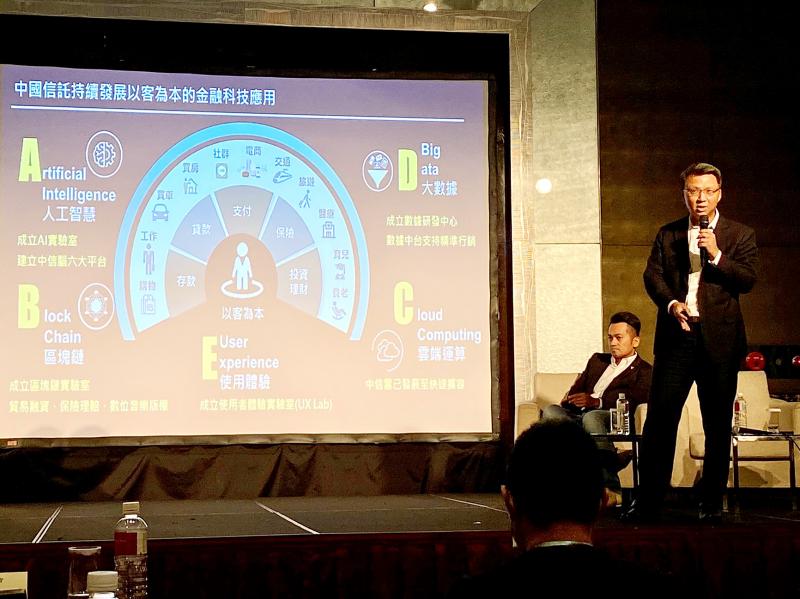Cathay United Bank (國泰世華銀行) plans to use artificial intelligence and big data analysis to learn what customers need and maintain their loyalty, as emerging virtual banks are likely to poach existing establishments’ clients with fancy marketing and rewards, Cathay United Bank president Alan Lee (李偉正) said.
“No bank dares to say that they are not worried about competition from new virtual banks, and neither can we, but our advantage is that we have long relationships with our clients, know them better and can provide financial products to suit their exact preferences,” Lee said on Wednesday last week.
For example, the bank has used big data analysis to choose people who have a high demand for funds and might be interested in applying for personal loans, Lee said, adding that Cathay United then sends marketing information to those potential clients.

Photo: Kao Shih-ching, Taipei Times
Among the 5 million clients who use Cathay United Bank’s credit cards, about 60 percent have applied for its other financial products, such as mortgages, wealth management products or small loans, Lee said.
The bank aims to raise that ratio, he added.
“The more products the clients have or the more frequently they interact with us, the more difficult it is for them to leave us and the more loyal they are likely to become,” Lee said.
Cathay United Bank does not invest in any of the nation’s three virtual banks. The lender had 680,330 digital savings accounts as of the end of June, the second-highest after Taishin International Bank’s (台新銀行) Richart service, Financial Supervisory Commission data showed.
CTBC Bank (中國信託銀行), which holds a 5 percent stake in Web-only Line Bank (連線商業銀行), would not share its financial technology with the virtual bank, as it does not have a controlling stake in the lender, CTBC Financial Holding Co chief technology officer Titan Chia (賈景光) said.
CTBC Bank is also using artificial intelligence, blockchain technology, cloud computing, big data and user experiences to improve its online banking services, Chia said.
The bank might allow Line Bank’s clients to withdraw cash or conduct other transactions at its automated teller machines, with Line Bank paying the handling fees, he added.

Stephen Garrett, a 27-year-old graduate student, always thought he would study in China, but first the country’s restrictive COVID-19 policies made it nearly impossible and now he has other concerns. The cost is one deterrent, but Garrett is more worried about restrictions on academic freedom and the personal risk of being stranded in China. He is not alone. Only about 700 American students are studying at Chinese universities, down from a peak of nearly 25,000 a decade ago, while there are nearly 300,000 Chinese students at US schools. Some young Americans are discouraged from investing their time in China by what they see

MAJOR DROP: CEO Tim Cook, who is visiting Hanoi, pledged the firm was committed to Vietnam after its smartphone shipments declined 9.6% annually in the first quarter Apple Inc yesterday said it would increase spending on suppliers in Vietnam, a key production hub, as CEO Tim Cook arrived in the country for a two-day visit. The iPhone maker announced the news in a statement on its Web site, but gave no details of how much it would spend or where the money would go. Cook is expected to meet programmers, content creators and students during his visit, online newspaper VnExpress reported. The visit comes as US President Joe Biden’s administration seeks to ramp up Vietnam’s role in the global tech supply chain to reduce the US’ dependence on China. Images on

New apartments in Taiwan’s major cities are getting smaller, while old apartments are increasingly occupied by older people, many of whom live alone, government data showed. The phenomenon has to do with sharpening unaffordable property prices and an aging population, property brokers said. Apartments with one bedroom that are two years old or older have gained a noticeable presence in the nation’s six special municipalities as well as Hsinchu county and city in the past five years, Evertrust Rehouse Co (永慶房產集團) found, citing data from the government’s real-price transaction platform. In Taipei, apartments with one bedroom accounted for 19 percent of deals last

US CONSCULTANT: The US Department of Commerce’s Ursula Burns is a rarely seen US government consultant to be put forward to sit on the board, nominated as an independent director Taiwan Semiconductor Manufacturing Co (TSMC, 台積電), the world’s largest contract chipmaker, yesterday nominated 10 candidates for its new board of directors, including Ursula Burns from the US Department of Commerce. It is rare that TSMC has nominated a US government consultant to sit on its board. Burns was nominated as one of seven independent directors. She is vice chair of the department’s Advisory Council on Supply Chain Competitiveness. Burns is to stand for election at TSMC’s annual shareholders’ meeting on June 4 along with the rest of the candidates. TSMC chairman Mark Liu (劉德音) was not on the list after in December last